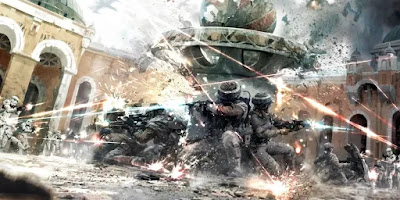The Star Wars franchise is in a really weird place right now. The movies are on hiatus (again), but the franchise is taking off on television. The pen-and-paper roleplaying game from Fantasy Flight has been canned despite good sales, but the current books and comics seem to be doing okay. Most puzzling has been the way that Electronic Arts has mishandled the video games licence since acquiring it seven years ago, with the news that an open-world spin-off from the Star Wars: Battlefront series has now been cancelled as well.
In May 2013, Electronic Arts announced that it had joined forces with Lucasfilm to develop a new generation of Star Wars video games. Previous games had been developed either by LucasArts (Lucasfilm's video games division) or in partnership between LucasArts and a host of talented third-party studios, including Totally Games, BioWare, Obsidian Entertainment, Pandemic Studios and Raven Software. These had included well-received titles including TIE Fighter, Knights of the Old Republic, Dark Forces, Jedi Academy and Republic Commando.
EA had worked closely with Lucasfilm and LucasArts on The Old Republic, a massively multiplayer game developed by EA's subsidiary BioWare and released in 2011. EA confidently believed their roster of talented subsidiary studios could release a plethora of high-quality Star Wars video games over the succeeding years. At first EA considered continuing the two Star Wars games in development at Lucasfilm, namely First Assault and 1313. The former was an online multiplayer shooter, whilst the latter was a story-focused action game set in Coruscant's criminal underworld. The former was feature-complete and beta-ready, whilst 1313 was starting to come together in a satisfying manner after several years of false starts.
Ultimately EA decided to bin both games and set their own studios to work. BioWare would continue to work on developing The Old Republic, with an eye to developing a new single-player game further down the line, possibly Knights of the Old Republic III. However, that idea never made it very far as BioWare's next several projects (Dragon Age: Inquisition, Mass Effect: Andromeda and Anthem) all hit hugely troubled development periods themselves.
Next up was Visceral Games, where a story-focused Star Wars heist game entered development under Uncharted producer Amy Hennig. Simultaneously, Respawn Entertainment was set to work on a story-focused Star Wars shooter/action game and DICE was to work on resurrecting the classic Star Wars Battlefront multiplayer series.
Visceral and Respawn developed their projects in tandem until late 2017, when Visceral was shut down and its Star Wars game abruptly cancelled. The assets from the game were moved to EA Vancouver to develop a brand new "open world" Star Wars game, possibly a reaction to the success of open world games like Skyrim, The Witcher III and Grand Theft Auto V. What exactly a Star Wars "open world" game would look like was rather unclear, but it sounds like it would have involved bounty hunters and space travel between several regions on several different planets. This new game was cancelled in turn in late 2018.
Respawn's project pivoted away from being a straight shooter to being a more general action game, which may have been the reason for Visceral's game being dropped (the two projects sounded more distinct at the start but then became more similar). Respawn's buy-out deal with EA was apparently very generous towards Respawn and granted the company a degree of self-autonomy which EA's other subsidiaries do not enjoy, explaining why the company got priority in this race. Respawn eventually released their game, Star Wars Jedi: Fallen Order last autumn to reasonably strong reviews.
EA Vancouver meanwhile set to work on a derivation of the Star Wars Battlefront series, potentially an open-world title which would have used the engine and systems of Battlefront but with a different focus, potentially similar to the relationship between the multiplayer Battlefield games and the single-player/coop-focused Bad Company and Hardline side-games. However, EA wanted the project for the release of the next-gen consoles in late 2020. When it became clear the game would miss that window, they cancelled it last year.
The result is that after seven years, five studios and untold hundreds of millions of dollars, precisely three games have actually been released: Battlefront (2015), Battlefront II (2017) and Fallen Order (2019). Avoiding total embarrassment, these games have sold very well: the Battlefront games have totalled over 24 million sales and Fallen Order has sold over 8 million copies in just two months on sale. But questions need to be asked about why so many promising games from talented developers have been canned and wrecked along the way.
Particularly interesting is the news that a Knights of the Old Republic reboot is in development at EA (but not with BioWare), along with a Fallen Order sequel at Respawn. The future roster of video games beyond that is doubtful at the moment, especially given that the EA deal reportedly expires in 2023, meaning that any game that started development right now is unlikely to be released before it expires.

2 comments:
Nothing about this is really a Star Wars issue. It really is all an EA issue. Nobody really understands how that company continues to exist.
The real mystery is why Disney has not made moves to take back the license and give it to someone else who actually does something with it.
They have an exclusive contract, which reportedly expires in May 2023 (ten years after the original deal). It looks like they might get a Battlefront 3 and Jedi Fallen Order 2 out before then, but anything else looks iffy.
My guess is that Disney will open the licence up to different studios, and there's some rumours going round that a KotOR reboot is in the cards, possibly with a different publisher.
Post a Comment